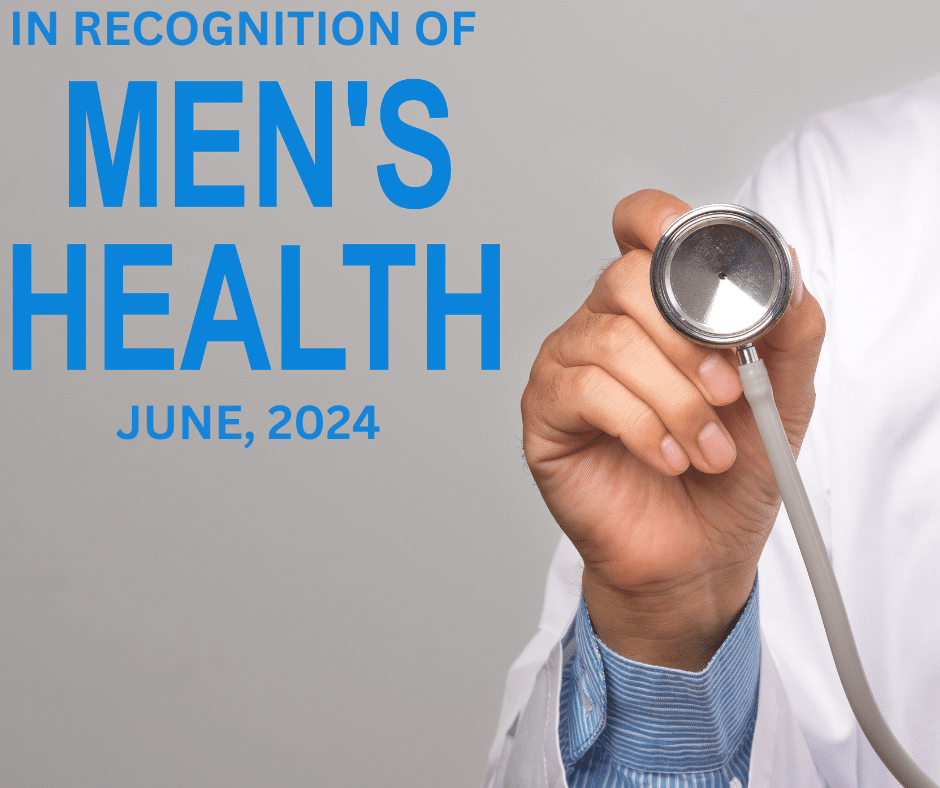
We’re shining the spotlight on Men’s Health this month, and for good reason. It doesn’t get enough attention from a lot of different parties, including the one it’s meant to support. As a matter of fact, a Cleveland Clinic survey done in 2019 found men are far less likely to seek medical help than their female counterparts. Whether we can blame men and men alone, stigma is a driver in that decision, and it is up to the rest of us to identify and tear it down.
Experts with the Cleveland Clinic point towards several reasons as to why men turn down medical help, even for the direst situations. Some fear receiving a troubling diagnosis or being judged by their doctors. Others take a more stubborn roadway and would rather not be told they have to change their lifestyle; but then there are those who are uncomfortable talking about certain symptoms or discomforts they are experiencing, and doctors say this could be the most costly and dangerous scenario for one’s health. For instance, erectile dysfunction and issues with urination might not be pleasant conversations to have with your doctor, but both of them can be signs of bigger underlying conditions.
At every stage of a man’s life, it can be dangerous for him to push medical exams to the side, especially as he enters into his senior years. following up on annual screenings are key to catching any abnormalities and making sure they don’t fall victim to conditions they are now more prone to with age. So, if you’re a man that is 65 years or older, take accountability for your health and keep this checklist on hand the next time you schedule a doctor’s appointment.
Essential Health Screenings for Men 65 Years and Older
Prostate Cancer
According to the American Cancer Society, prostate cancer is the most common cancer found in men in the U.S. but can be successfully treated when detected early. Current guidelines suggest males between the ages of 55 to 69 and transgender people who have a prostate are candidates for screening. However, you should consult with your doctor first to see if the benefits of the test actually outweigh the risks and if the test is ultimately right for you. The reason being, the tests aren’t foolproof and don’t always detect the cancer early, and according to the National Cancer Institute, prostate cancers don’t always need treatment, so it’s best to work closely with your doctor.
Testicular Cancer
Guidelines surrounding examinations for testicular cancer have changed, but it is still recommended that all men, not just seniors, get screened as part of their regular physical exam. Most of the time, the first symptom is a lump on the testicle, a swollen testicle or one might be larger than normal. Some testicular cancers may not show symptoms until they’ve reached more advanced stages which is why it is important to have regular check-ups.
Self-examinations have not been studied enough to know if they actually reduce deaths caused by testicular cancer, but the American Cancer Society urges any man who finds a lump or anything unusual to go to their doctor right away.
Blood Pressure
It’s advised that men 65 and older should have their blood pressure checked at least once every year. Having high blood pressure, especially as a senior, can lead to serious and even deadly health conditions such as heart disease, stroke, kidney disease and more. In between doctor visits, prevent high blood pressure through proper diet, exercise and stress management. You can buy your own personal device to check this anytime, use an automated machine at a local pharmacy or call your doctor anytime and make an appointment if you have any concerns about your blood pressure.
Colorectal Cancer
The American Cancer Society recommends older adults get screened for colorectal cancer on a regular basis until the age of 75. Your doctor will perform a series of tests like annual stool tests, and a colonoscopy every five to ten years. You may need to be screened more often depending on certain risk factors such as a family history, ulcerative colitis or a history of growths on your colon called adenomatous polyps.
Skin Exam
Right after prostate cancer, skin cancer is the second most common type of cancer among men in the U.S., according to the American Cancer Society. The American Academy of Dermatology says by age 50, men are more likely than women to develop melanoma, and that number jumps by the age of 65., making them two times as likely. In addition to regular skin exams, it’s a good idea to apply sunscreen before going outside and proper clothing and attire to protect your skin from UV rays. AAD recommends wearing waterproof sunscreen that offers SPF 30 broad-spectrum protection.
Diabetes Type 2
According to the National Council of Aging, nearly half of all people with type 2 diabetes are people aged 65 years or older. The American Diabetes Association recommends getting screened every three years starting at the age of 45. Your doctor may screen you more often if you have certain risk factors like a family history, are overweight, have high blood pressure, prediabetes or a history of heart disease. Also, look out for symptoms and tell your doctor if you experience increased thirst or urination, excessive fatigue, increased appetite, dizziness or fainting, as these could be warning signs of type 2 diabetes.
Abdominal Aortic Aneurysm
An Abdominal Aortic Aneurysm is a condition that most commonly develops in older men and smokers. Over time, it grows slowly, often without symptoms, and can be life-threatening if it bursts. If you are a male 65 to 75-years of age who smoked, it’s recommended you get screened regularly. Your doctor will perform an ultrasound to check for one. As an abdominal aortic aneurysm grows, some people may notice a pulsating feeling near their belly button. Pain in their back, belly or side could be a sign of an impending rupture.
Cholesterol
Depending on your risk factors and whether or not you have a history of high cholesterol, your doctor will want to check your levels every five years. They may test sooner if changes in your lifestyle occur like weight gain, diet changes, or if you develop health conditions like diabetes, heart disease or kidney problems.
Osteoporosis
Osteoporosis is a disease where mineral density and bone mass decreases. You should get screened for osteoporosis, especially if you’ve smoked, have low body weight, drink heavily, had a fracture after the age of 50, were a long-time user of steroids or have a family history of hip fracture or osteoporosis.
Regular Physical Exams
Following up with your doctor every year is one of the most effective ways to combat health issues you may be experiencing. While it may feel uncomfortable to have those conversations, remember that opening up to your physician can make all the difference in your health and quality of life. Regular visits can also help solidify trust with your family practitioner and help you overcome any anxieties you may have about your next appointment.
Blog by: Xiana Fontno
Sources:
https://medlineplus.gov/ency/article/007466.htm “Health Screenings for Men Age 65 and Older”
https://www.goodrx.com/health-topic/senior-health/health-screenings-ages-65-and-older
https://www.cancer.org/cancer/types/prostate-cancer/detection-diagnosis-staging/acs-recommendations.html
https://diabetes.org/about-diabetes/type-2
